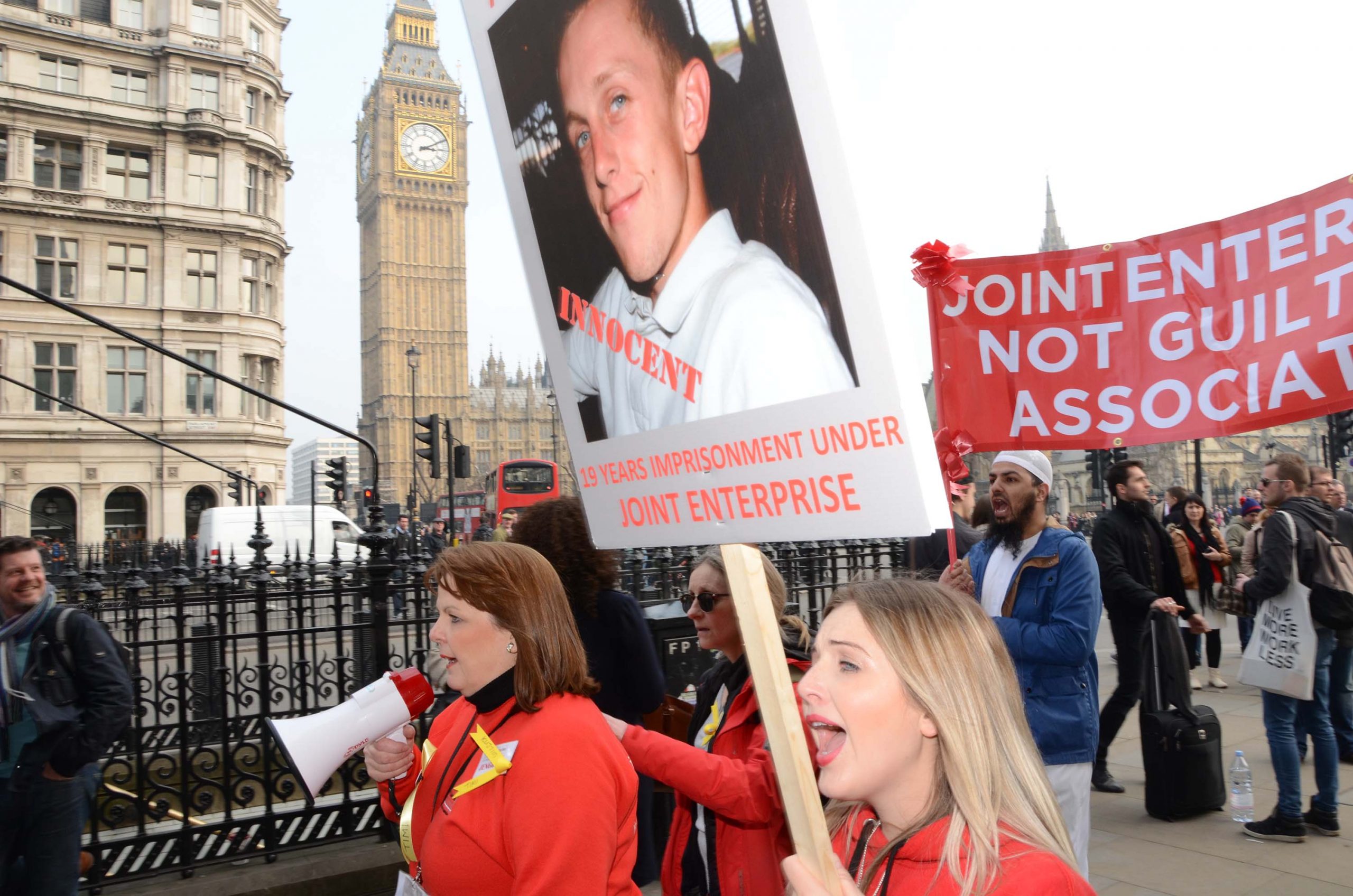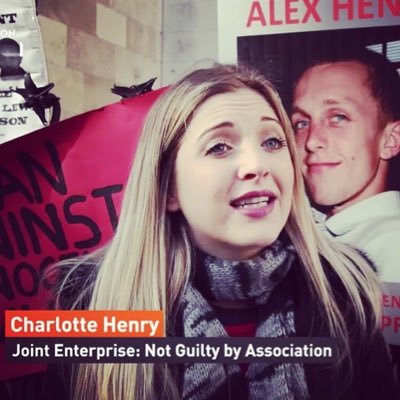‘I didn’t believe that you could get put in prison for a crime if you didn’t do it’

Little more than a child: Edward Conteh
Murder is to intentionally take another’s life. For such a heinous crime there must be an equally severe punishment. Something to hurt the perpetrator, deter others and protect society from further harm.
Those who commit murder deserve the shame and the punishment that are attached to the label ‘murderer’. But what if they didn’t kill anyone? If they didn’t cause, contribute, plan or intend the death, but the legal system decided they deserved the punishment anyway.
Edward Conteh was little more than a child when he was convicted of the manslaughter of teenager Nicholas Pearton. A Belgium national, Edward had never been in trouble with the police before. His story begins in 2010, when outside school, a playground bicker turned into a fight which ended the life of one and imprisoned seven others – three for murder and four for manslaughter.
Despite not being present when the actual stabbing was committed, nor contemplating the possibility of it, Edward (then 16) was convicted and sentenced to seven years’ imprisonment.
Usually to be convicted of murder the perpetrator must physically cause the death of the victim, whether he pulled the trigger or wielded the knife. Furthermore they must do this while intending to kill or at the very least intending to cause really serious harm. This physical act of taking the life, coupled with the mental intent to commit it, are the two essential ingredients for a conviction of murder.
However it has also been known that many do not kill alone, but are in fact supported by another. This secondary party, previously known as the ‘aider or abettor’, and more recently as an ‘assister or encourager’, are liable to be tried, indicted and sentenced as if they had physically taken the life. Their physical conduct is the act constituting ‘assistance or encouragement’ and once coupled with the requisite mental element – the intent to provide such support, the essentials of the offence are fulfilled.

Top row (left to right): Dale Green, Lamarr Gordon, Joseph Appiah and Demar Brown. Bottom row (left to right) Terell Clement, Claude Gaha, Edward Conteh and Sheldon Gordon (Pic: Metropolitan Police/PA)
This scenario is known as joint enterprise, which in its broadest sense enables two or more people to be convicted of committing the same crime – whether as principals (those who deliver the fatal blow) or as a secondary party (those who assist or encourage). Joint Enterprise is a 300 year-old common law doctrine, not enshrined in legislation and therefore has been interpreted and reinterpreted over time, widening in application with each judgment.
This type of joint enterprise, known as accessorial liability (AL) was relatively uncontroversial in theory, until another term came into the legal lexis – parasitic accessorial liability (PAL).
Parasitic accessorial liability encompasses the situation whereby a group of two of more people commit a crime (crime A) and during the course of committing the crime a member of the party commits a further crime (crime B). Those who participated in the first crime may not have planned or intended crime B, but so long as they foresaw the possibility that it might be committed, are liable for it.
This may not immediately appear too problematic – until we look at the finer detail. To be taken to have participated in crime A, the defendant does not actually need to physically assist or verbally encourage it. A defendant can be held, and often is held, to have participated in crime A by his mere presence at the scene. Taking a spontaneous affray as an example, the defendant may not physically participate or verbally egg on the fight but instead may simply be present. His presence at the scene can be inferred as ‘intentional encouragement’ of the affray, and therefore he is not only guilty of the affray, but all other crimes which he foresaw might occur – even Murder.
However even if it cannot be proven that the defendant ‘foresaw’ the possibility of the death, the defendant can still be convicted of manslaughter – this is what happened to Edward Conteh.
The fatal incident began outside Sedgehill School when two members, Claude Gaha and Dale Green from the ‘SG’ group clashed with two members, Marcel and Jamal, of the ‘Sydenham boys’. The argument faded, the group dispersed and no blows were exchanged which should and could have been the end of the matter.
Shortly after the brief confrontation, at 3.23pm Claude telephones Edward telling him about the incident at school. At 5.10pm two friends, Lamar Gordon and Terell Clement arrive at Edward’s house and stay until 6pm before all three join with Dale Green, Demar Brown and Joseph Appiah to travel to Home Park in Sydenham.
It is summer, children are playing and the park is buzzing with life. As he entered the park Edward saw the ‘Sydenham boys’, they beckoned for the ‘SG’ group to come forward – a welcome invitation. Suddenly the ‘Sydenham boys’ ran out of the park only to reappear, this time armed with knives. A stand-off ensued and Edward not wishing to fight, saw a discarded bike from the rival group and made off with it away from the confrontation which is supported by CCTV footage. But Nicholas Pearton, a member of the ‘Sydenham boys’ showed up late, and became isolated from the rest of his peers. Alone he ran out of the park and across the main road pursued by members of ‘SG’.
The days of fist fighting to settle a score are long gone with some of today’s youth. Nicholas Pearton was stabbed in the back and died within minutes while attempting to shield himself inside the premises of a local takeaway.
His tragic murder at the hands of Dale Green featured in a BBC One documentary ‘Guilty by Association’ highlighting the wrongful conviction of Edward Conteh and another who remained behind inside the park, Joseph Appiah, who was later convicted of murder under Joint Enterprise despite also being 200 yards away at the time.
‘When Edward came home that day it was very late,’ Conteh’s mother Memunatu explained to the Bureau of Investigative Journalism (TBIJ) ‘When I saw Edward’s face there was panic. I asked what happened and he said: “Mummy they said my friends stabbed someone.”’
Talking to the TBIJ’s Maeve McClenaghan, Conteh said: ‘I didn’t do anything. I was just a kid really, it was my mates from school said come out with them so I went, I didn’t know what was going to happen.’
‘I hadn’t heard of joint enterprise at all before, even at the trial I didn’t believe that you could get put in prison for a crime if you didn’t do it.’
Edward Conteh, 2014

Charlotte Henry campaigning on behalf of her brother who was convicted of murder under joint enterprise
Memunatu then met Gloria Morrison who heads the campaign group JENGbA (Joint Enterprise Not Guilty by Association) and asked if she could help. JENGbA is a grassroots campaign group, which was formed in 2010 by four angry women. They are currently supporting over 700 prisoners wrongfully imprisoned under the law of Joint Enterprise.
On June 6 2011 Edward was acquitted of murder but convicted of manslaughter and sentenced to seven years’ imprisonment. A psychologist at the trial testified that his abnormally low IQ meant he was unable to foresee consequences like others therefore would not have been able to foresee that another might use a knife to inflict serious harm.
Joseph Appiah, 16, was convicted of murder despite also being 200 yards across the park with Edward in an unfamiliar area with acquaintances he had only recently met. He received a sentence of 12 years which is a minimum mandatory sentence and means he has to serve every single one of those years before he is considered for parole. He has since contracted tuberculosis in HMP & YOI Swinfen Hall (along with most of his wing) which has seriously compromised his health. Joseph is a bright young man who had a promising future ahead of him and now works with JENGbA as an inside campaigner to help motivate other joint enterprise prisoners not to give up hope.
Edward had almost lost all chance of clearing his name, when on February 18 2016, in the case of R v Jogee, the Supreme Court declared that joint enterprise had been misapplied by the judiciary for 30 years. A defendant cannot be convicted for murder on mere ‘foresight’ (PAL), but rather the test should be whether they ‘intentionally assisted or encouraged’ (AL) the principal to commit the offence. Instead those found to have foreseen harm but nonetheless engaged in the unlawful act, should be convicted of manslaughter and those, like Edward, who do not foresee the offence at all as the harm was caused by an uncontemplated ‘overwhelming supervening act’ should bear no criminal responsibility for the death.
Edward has served his sentence and like many now has a good chance to appeal his conviction to clear his name. His appeal has been lodged at the Criminal Cases Review Commission, however as a foreign national convicted of a crime he is threatened with imminent deportation to Belgium which would separate him from his mother and four siblings who he would be forced to leave behind.
JENGbA’s intervention in the Supreme Court decision has shown that the misinterpretation of the doctrine of Joint Enterprise has, without doubt, caused miscarriages of justice. But this injustice prevails. There remains a great deal of controversy surrounding this law which will continue into the foreseeable future. There will continue to be vast uncertainty surrounding the status of those wrongfully convicted of murder but still in a cell, separated from their families, serving the harshest of punishments under an incorrect law.
The Court of Appeal is struggling with a backlog of appeals and will only allow appeals in ‘out of time’ cases where there has been a ‘substantial injustice’ – the definition for which they are still deliberating over.
There is no doubt that the prisoner who has suffered an injustice will find it harder to serve their time than those who can make sense of their conviction. Families may fight against the injustice or may crumple with the despair – a fact known only too well by one young prisoner whose mother took her own life recently.
Being wrongfully imprisoned for a murder is a substantial injustice. Now let them go.







